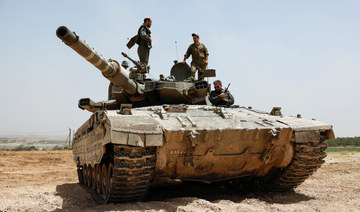GAZA: Israel launched devastating air strikes on Gaza early Thursday while also saying it is ready to resume stalled talks on a truce and hostage release deal with Hamas to pause the war raging since October 7.
The Gaza Strip’s civil defense agency said two pre-dawn air strikes had killed 26 people, including 15 children, in Gaza City alone.
Agency spokesman Mahmud Bassal said one strike hit a family house, killing 16 people, in the Al-Daraj area, and another killed 10 people inside a mosque compound.
There was no immediate comment from the Israeli military.
Fierce street battles also raged in Gaza’s Jabalia and Rafah where the armed wings of Hamas and its ally Islamic Jihad said they had fired mortar barrages at Israeli troops.
International pressure for a ceasefire has mounted on Israel and its Prime Minister Benjamin Netanyahu as three European countries said Wednesday they would recognize a Palestinian state.
The week started with the International Criminal Court’s prosecutor seeking arrest warrants on war crimes charges against Netanyahu and his defense minister as well as three Hamas leaders.
Israel has angrily rejected those moves, voicing “disgust” over the ICC request and labelling any recognition of Palestinian statehood a “reward for terrorism.”
But domestic pressure has also risen as supporters of hostages trapped in Gaza again rallied outside Netanyahu’s office, passionately demanding a deal to bring them home.
A newly released video showed five female Israeli soldiers, tied up and some with bloodied faces, in the hands of Palestinian militants during the attack more than seven months ago.
The three-minute clip, taken from a militant’s body camera footage, was released by the Hostage and Missing Families Forum on Wednesday after the Israeli army lifted censorship on it.
“The footage reveals the violent, humiliating and traumatising treatment the girls endured on the day of their abduction, their eyes filled with raw terror,” the forum said.
Netanyahu vowed to continue fighting Hamas to “ensure what we have seen tonight never happens again.”
But his office also said that the war cabinet had asked the Israeli negotiating team “to continue negotiations for the return of the hostages.”
The previous round of truce talks, involving US, Egyptian and Qatari mediators, ended shortly after Israel launched its attack on Gaza’s far-southern city of Rafah early this month.
Israel went ahead with the assault on the last city in Gaza to be entered by its ground troops in defiance of global opposition, including from top ally the United States.
Washington voiced concerns that about 1.4 million Palestinians who had been trapped in the city would be caught in the line of fire.
Israel has since ordered mass evacuations from the city, and the UN says more than 800,000 people have fled.
US President Joe Biden’s national security adviser, Jake Sullivan, said the Rafah operation “has been more targeted and limited” than feared and “has not involved major military operations into the heart of dense urban areas.”
But he stopped short of saying that Israel had addressed US concerns, adding that Washington was closely watching ongoing Israeli actions.
Israel’s national security adviser Tzachi Hanegbi has meanwhile given a bleak assessment of the war to a meeting of parliament’s foreign affairs and defense committee, according to a report by Israel’s Channel 13.
He reportedly said that Israel has “not achieved any of the strategic aims of the war — not conditions for a hostage deal; we haven’t toppled Hamas; and we haven’t allowed residents of the (Gaza) periphery to safely return home.”
The bloodiest ever Gaza war broke out after Hamas’s unprecedented attack on October 7 resulted in the deaths of more than 1,170 people, mostly civilians, according to an AFP tally of Israeli official figures.
Militants also took 252 hostages, 124 of whom remain in Gaza, including 37 the army says are dead.
Israel’s retaliatory offensive has killed at least 35,800 people in Gaza, mostly women and children, according to the Hamas-run territory’s health ministry.
Heavy fighting raged again in Gaza, where the military said troops in Rafah had “dismantled a number of tunnel shafts and launchers in the area, and eliminated several terrorists during close-quarters encounters.”
Urban combat has also flared again in northern areas, including Jabalia, which Israeli forces first entered several months ago.
Israeli forces there “targeted several Hamas terrorists during strikes on military compounds” and located AK-47 rifles, grenades and other weaponry, the military said.
Israel has also imposed a siege that has deprived Gaza’s 2.4 million people of most clean water, food, medicines and fuel.
The sporadic arrival of aid by truck slowed further after Israeli forces took control of the Palestinian side of the Rafah border crossing with Egypt.
Jordan and others have airdropped relief goods into Gaza and some aid has been shipped in via a US-built pier, but many trucks have been quickly swarmed by desperate crowds.
Israel has faced ever greater opposition to the bloody war from around the world, and pro-Palestinian protests have swept university campuses.
Israel reacted with fury after Ireland, Norway and Spain said they would recognize a Palestinian state on May 28, a move praised by Palestinians and across the Arab world.
Israel recalled its envoys to Dublin, Oslo and Madrid and summoned the three ambassadors for a rebuke.
Most Western governments say they are willing to recognize Palestinian statehood one day, but not before thorny issues such as final borders and the status of Jerusalem are settled.
The White House said Biden opposed unilateral recognition of a Palestinian state, saying it should be realized “through direct negotiations.”
Irish Prime Minister Simon Harris called the October 7 attack “barbaric” but stressed that “a two-state solution is the only way out of the generational cycles of violence.”
Israel launches deadly Gaza strikes, says ready for new truce talks
https://arab.news/vjgz9
Israel launches deadly Gaza strikes, says ready for new truce talks
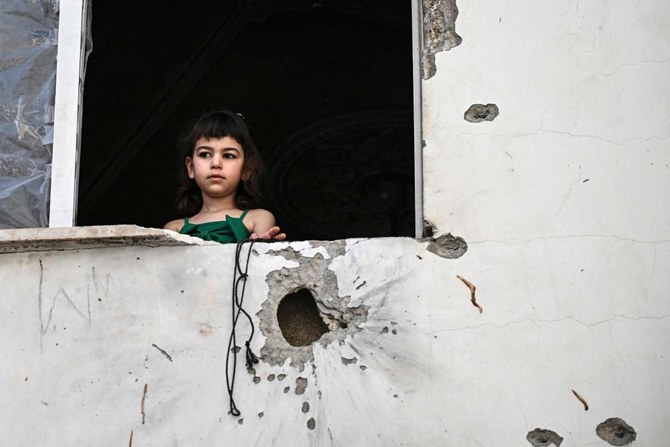
- Gaza Strip’s civil defense agency said two pre-dawn air strikes had killed 26 people, including 15 children, in Gaza City alone
- Agency spokesman Mahmud Bassal said one strike hit a family house, killing 16 people, in the Al-Daraj area, and another killed 10 people inside a mosque compound
How climate change is exacerbating food insecurity, with dangerous consequences for import-reliant Middle East

- UN report show nations are falling well short of achieving the Sustainable Development Goal of eliminating hunger by 2030
- FAO expert warns that climate shocks could lead to more conflict in the region over limited access to water and resources
RIYADH: Global food insecurity is far worse than previously thought. That is the conclusion of the State of Food Security and Nutrition in the World 2024 report published this week by a coalition of UN entities, which found that efforts to tackle undernourishment had suffered serious setbacks.
As countries across the world fall significantly short of achieving the second UN Sustainable Development Goal of “zero hunger” by 2030, the report notes that climate change is increasingly recognized as a pivotal factor exacerbating hunger and food insecurity.

As a major food importer, the Middle East and North Africa region is considered especially vulnerable to climate-induced crop failures in source nations and the resulting imposition of protectionist tariffs and fluctuations in commodity prices.
“Climate change is a driver of food insecurity for the Middle East, where both the global shock and the local shock matter,” David Laborde, director of the Agrifood Economics and Policy Division at the Food and Agriculture Organization of the UN, told Arab News.
“Now, especially for the Middle East, I think that the global angle is important because the Middle East is importing a lot of food. Even if you don’t have a (climate) shock at home, if you don’t have a drought or flood at home — if it’s happened in Pakistan, if it’s happened in India, if it’s happened in Canada — the Middle East will feel it.”
Opinion
This section contains relevant reference points, placed in (Opinion field)
The State of Food Security and Nutrition in the World report has been compiled annually since 1999 by FAO, the International Fund for Agricultural Development, the UN Children’s Fund, the World Food Programme, and the World Health Organization to monitor global progress toward ending hunger.
During a recent event at the UN headquarters in New York, the report’s authors emphasized the urgent need for creative and fair solutions to address the financial shortfall for helping those nations experiencing severe hunger and malnutrition made worse by climate change.
In addition to climate change, the report found that factors like conflict and economic downturns are becoming increasingly frequent and severe, impacting the affordability of a healthy diet, unhealthy food environments, and inequality.
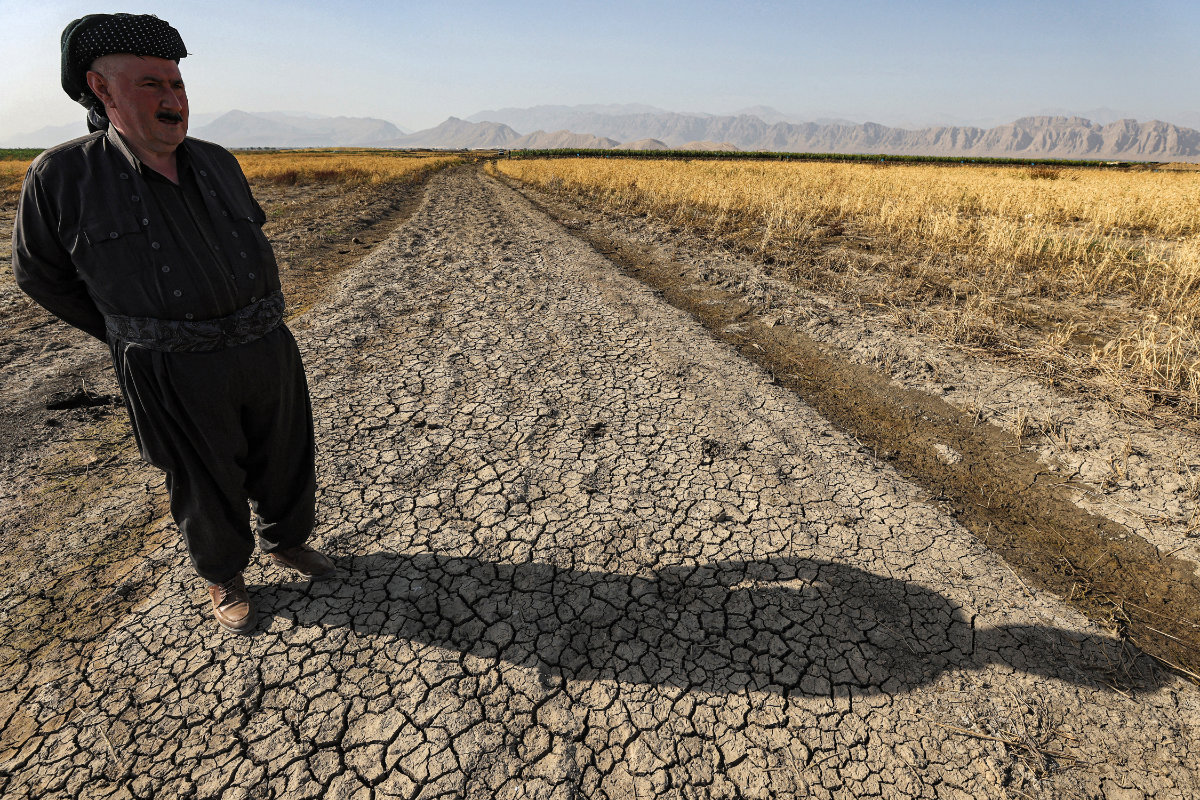
Indeed, food insecurity and malnutrition are intensifying due to persistent food price inflation, which has undermined economic progress globally.
“There is also an indirect effect that we should not neglect — how climate shock interacts with conflict,” said Laborde.
In North Africa, for example, negative climate shocks can lead to more conflict, “either because people start to compete for natural resources, access to water, or just because you may also have some people in your area that have nothing else to do,” he said.
“There are no jobs, they cannot work on their farm, and so they can join insurgencies or other elements.”
DID YOUKNOW?
Up to 757 million people endured hunger in 2023 — the equivalent of one in 11 worldwide and one in five in Africa.
Global prevalence of food insecurity has remained unchanged for three consecutive years, despite progress in Latin America.
There has been some improvement in the global prevalence of stunting and wasting among children under five.
In late 2021, G20 countries pledged to take $100 billion worth of unused Special Drawing Rights, held in the central banks of high-income countries and allocate them to middle- and low-income countries.
Since then, however, this pledged amount has fallen $13 billion short, with those countries with the worst economic conditions receiving less than 1 percent of this support.
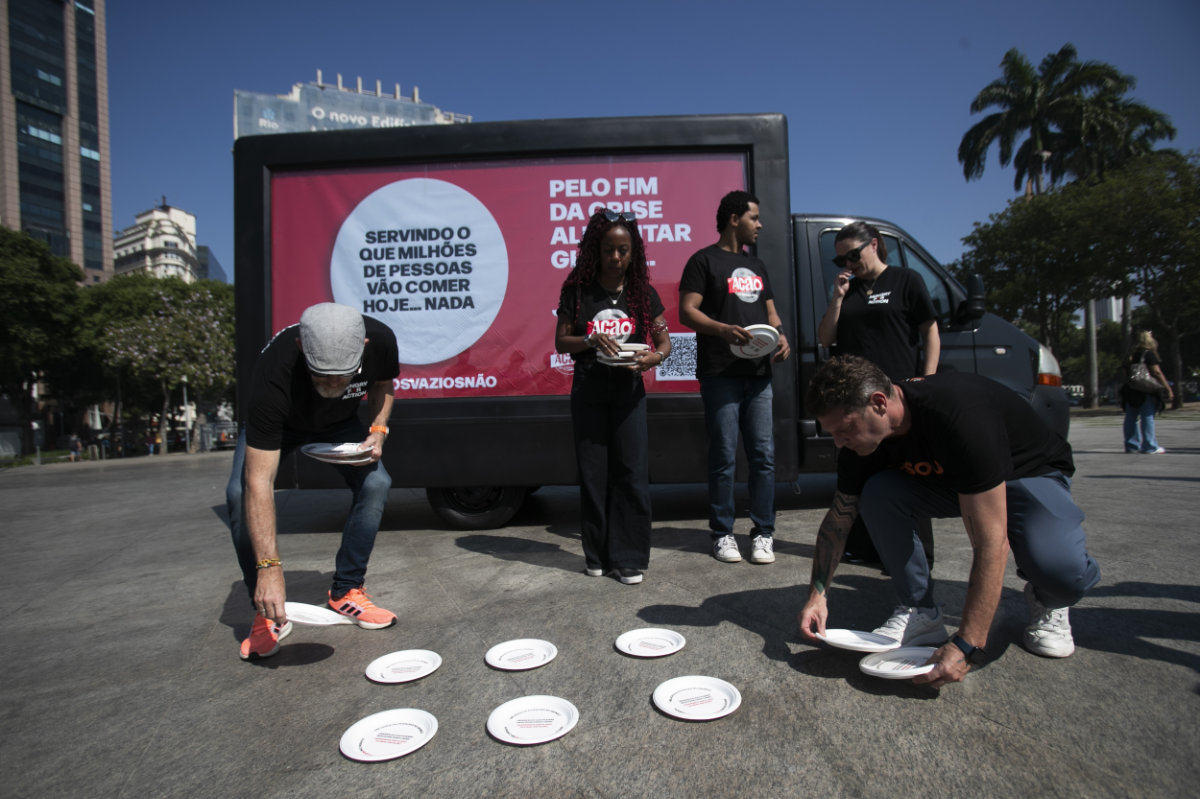
Saudi Arabia is one of the countries that has exceeded its 20 percent pledge, alongside Australia, Canada, China, France, and Japan, while others have failed to reach 10 percent or have ceased engagement altogether.
“Saudi Arabia is a very large state in the Middle East, so what they do is important, but also they have a financial capacity that many other countries don’t,” said Laborde.
“It can be through their SDRs. It can also be through their sovereign fund because where you invest matters and how you invest matters to make the world more sustainable. So, I will say yes, prioritizing investment in low- and middle-income countries on food and security and nutrition-related programs can be important.
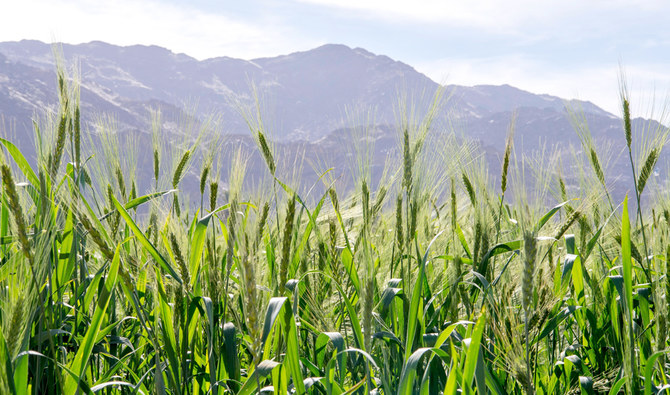
Although the prevalence of undernourishment in Saudi Arabia has fallen in recent years, the report shows that the rate of stunting in children has actually increased by 1.4 percent in the past 10 years.
There has also been an increase in the rates of overweight children, obesity, and anemia in women as the population continues to grow. In this sense, it is not so much a lack of food but a dearth of healthy eating habits.
“Saudi Arabia is a good example where I would say traditional hunger and the lack of food … become less and less a problem, but other forms of malnutrition become actually what is important,” said Laborde.

In 2023, some 2.33 billion people worldwide faced moderate or severe food insecurity, and one in 11 people faced hunger, made worse by various factors such as economic decline and climate change.
The affordability of healthy diets is also a critical issue, particularly in low-income countries where more than 71 percent of the population cannot afford adequate nutrition.
In countries like Saudi Arabia where overeating is a rising issue, Laborde suggests that proper investment in nutrition and health education as well as policy adaptation may be the way to go.
While the Kingdom continues to extend support to countries in crisis, including Palestine, Sudan, and Yemen, through its humanitarian arm KSrelief, these states continue to grapple with dire conditions. Gaza in particular has suffered as a result of the war with Israel.
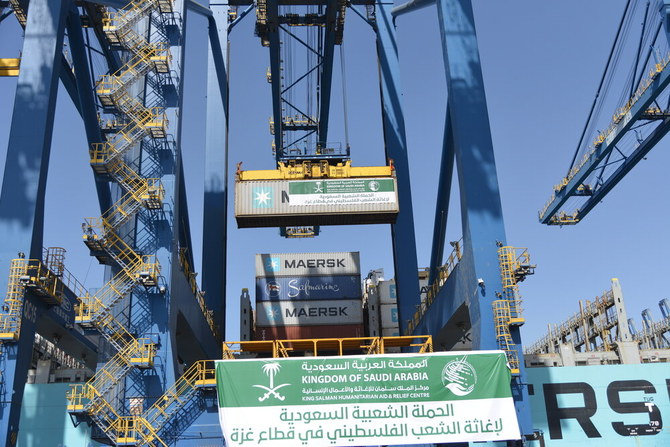
“Even before the beginning of the conflict, especially at the end of last year, the situation in Palestine was complicated, both in terms of agricultural system (and) density of population. There was already a problem of malnutrition,” said Laborde.
“Now, something that is true everywhere, in Sudan, in Yemen, in Palestine, when you start to add conflict and military operations, the population suffers a lot because you can actually destroy production. You destroy access to water. But people also cannot go to the grocery shop when the truck or the ship bringing food is disrupted.”
While Palestine and Sudan are the extreme cases, there are still approximately 733 million people worldwide facing hunger, marking a continuation of the high levels observed over the past three years.

“On the ground, we work with the World Food Programme (and) with other organizations, aimed at bringing food to the people in need in Palestine,” Laborde said of FAO’s work. “Before the conflict and after, we will also be working on rebuilding things that need to be rebuilt. But without peace, there are limited things we can do.”
FAO helps food-insecure nations by bringing better seeds, animals, technologies, and irrigation solutions to develop production systems, while also working to protect livestock from pests and disease by providing veterinary services and creating incentives for countries to adopt better policies.
The report’s projections for 2030 suggest that around 582 million people will continue to suffer from chronic undernourishment, half of them in Africa. This mirrors levels observed in 2015 when the SDGs were adopted, indicating a plateau in progress.
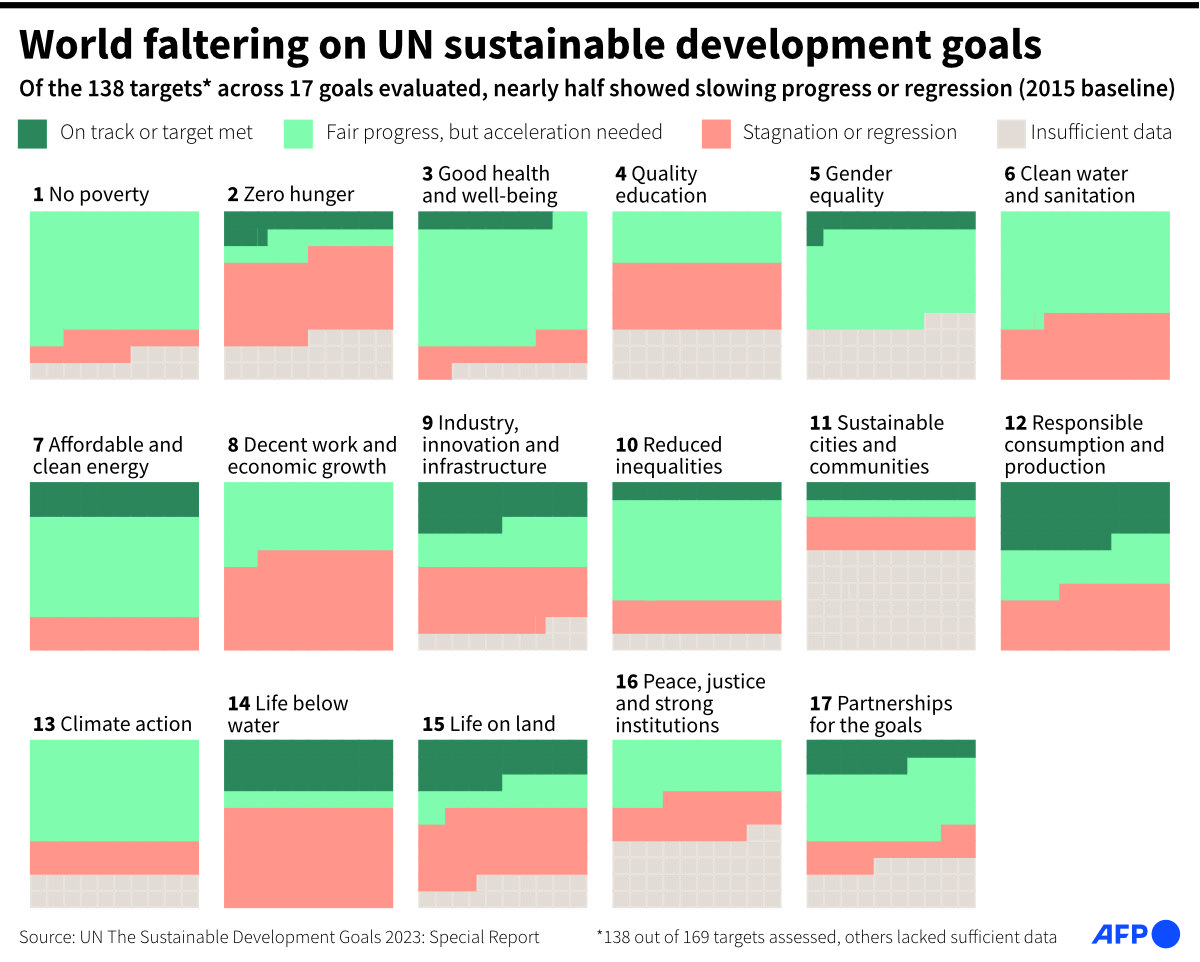
The report emphasizes the need to create better systems of financial distribution as per this year’s theme: “Financing to end hunger, food insecurity and all forms of malnutrition.”
“In 2022, there were a lot of headlines about global hunger, but today, this has more or less disappeared when the numbers and the people that are hungry have not disappeared,” said Laborde, referring to the detrimental impact of the war in Ukraine on world food prices.
“We have to say that we are not delivering on the promises that policymakers have made. The world today produces enough food, so it’s much more about how we distribute it, how we give access. It’s a man-made problem, and so it should be a man-made solution.”

Khan Yunis fighting displaces 180,000 Gazans in four days: UN

- Israel has killed at least 39,175 Palestinians in Gaza, according to the Hamas-run territory’s health ministry
KHAN YUNIS, Palestinian Territories: More than 180,000 Palestinians have fled fierce fighting around the southern Gaza city of Khan Yunis in four days, the United Nations said Friday, after an Israeli operation to extract captives’ bodies from the area.
Recent “intensified hostilities” in the Khan Yunis area, more than nine months into the Israel-Hamas war, have fueled “new waves of internal displacement across Gaza,” said the UN humanitarian agency, OCHA.
It said “about 182,000 people” have been displaced from central and eastern Khan Yunis between Monday and Thursday, and hundreds are “stranded in eastern Khan Yunis.”
The Israeli military on Monday ordered the evacuation of parts of the southern city, announcing its forces would “forcefully operate” there, including in an area previously declared a safe humanitarian zone.
On Wednesday, Israel said five bodies of captives seized during Hamas’s October 7 attack that triggered the war had been recovered from the area.
Israel’s military said on Friday that its forces had “eliminated approximately 100 terrorists” in the city this week.
Israel’s military chief, Lt. Gen. Herzi Halevi said the captives’ bodies were pulled from underground tunnels and walls in “a hidden place.”
Troops “were near those fallen bodies in the past, we did not know how to reach them” until this week, Halevi said in a statement.
Witnesses and rescuers said heavy battles continued around eastern Khan Yunis on Friday. The Nasser Hospital said 26 bodies were brought to the medical site.
The October 7 attack on southern Israel resulted in the deaths of 1,197 people, most of them civilians, according to an AFP tally based on official Israeli figures.
Out of 251 people taken hostage that day, 111 are still held in the Gaza Strip, including 39 the military says are dead.
Israel’s retaliatory offensive against Hamas has killed at least 39,175 Palestinians in Gaza, according to the Hamas-run territory’s health ministry.
According to UN figures, the vast majority of Gaza’s 2.4 million people have been displaced at least once by the fighting.
Gaza mediators, Israel spy chief to meet in Rome: Egypt media

- Cairo would also like to see a “complete (Israeli) withdrawal from the Rafah crossing” connecting Gaza to Egypt, the official added
CAIRO: Egyptian, Qatari and US mediators are to meet with Israeli negotiators in the Italian capital Sunday in the latest push for a Gaza truce, Egyptian state-linked media said.
“A four-way meeting between Egyptian officials and their American and Qatari counterparts, in the presence of Israel’s intelligence chief, will be held in Rome on Sunday to reach an agreement on a truce in Gaza,” Al-Qahera news, which has links to Egyptian intelligence, reported on Friday, citing a “senior official” who was not identified.
Egypt, along with Qatar and the United States, has been involved in months of mediation efforts aimed at ending the Israel-Hamas war raging in the Gaza Strip for more than nine months.
The proposed truce deal would be linked to the release of hostages held by Gaza militants in exchange for Palestinian prisoners held in Israel.
US news outlet Axios separately reported that CIA Director Bill Burns is expected to hold talks on the issue in Rome on Sunday with Israeli, Qatari and Egyptian officials.
The official quoted by Al-Qahera News said Egypt insists on “an immediate ceasefire” as part of the agreement, which should also “ensure the entry of humanitarian aid into Gaza” and “safeguard the freedom of movement” of civilians in the Palestinian territory.
Cairo would also like to see a “complete (Israeli) withdrawal from the Rafah crossing” connecting Gaza to Egypt, the official added.
Recent mediation efforts have focused on a framework which US President Joe Biden presented in late May, billing it an Israeli proposal.
On Thursday, Israeli Prime Minister Benjamin Netanyahu addressed Congress, pleading for continued US support, before meeting with Biden and Vice President Kamala Harris.
Harris, the presumptive Democratic nominee in the US presidential election later this year, said after the meeting she would not be “silent” on the suffering in Gaza and that it was time to end the “devastating” conflict.
The Gaza war began after Hamas’s October 7 attack on southern Israel resulted in the deaths of 1,197 people, most of them civilians, according to an AFP tally based on official Israeli figures.
Out of 251 people taken hostage that day, 111 are still held in the Gaza Strip, including 39 the military says are dead.
Israel launched a retaliatory campaign against Gaza rulers Hamas, killing at least 39,175 people in the territory, according to its health ministry, which does not give details of civilian and militant deaths.
Desperate for shelter, Gazans move to former prison

- Israel has killed 39,000 Palestinians according to health officials in Gaza
GAZA: After weeks of Israeli bombardment left them with nowhere else to go, hundreds of Palestinians have ended up in a former Gaza prison built to hold murderers and thieves.
Yasmeen Al-Dardasi said she and her family passed wounded people they were unable to help as they evacuated from a district in the southern city of Khan Younis toward its Central Correction and Rehabilitation Facility.
They spent a day under a tree before moving to the former prison, where they now live in a prayer room. It offers protection from the blistering sun but not much else.
Al-Dardasi’s husband has a damaged kidney and just one lung but no mattress or blanket.
“We are not settled here either,” said Al-Dardasi, who, like many Palestinians, fears she will be uprooted once again.
Israel has said it goes out of its way to protect civilians.
Palestinians, many of whom have been displaced several times, say nowhere is free of Israeli bombardment, which has reduced much of Gaza to rubble.
An Israeli airstrike killed at least 90 Palestinians in a designated humanitarian zone in the Al-Mawasi area on July 13, the territory’s Health Ministry said, in an attack that Israel said targeted Hamas’ elusive military chief, Mohammed Deif.
On Thursday, Gaza’s Health Ministry said Israeli military strikes on areas in eastern Khan Younis had killed 14 people.
Entire neighborhoods have been flattened in one of the most densely populated places in the world, where poverty and unemployment have long been widespread.
According to the UN, nine in ten people across Gaza are now internally displaced.
Israeli soldiers told Saria Abu Mustafa and her family that they should flee for safety as tanks were on their way, she said. The family had no time to change and left in prayer clothes.
After sleeping outside on sandy ground, they, too, found refuge in the prison, among piles of rubble and gaping holes in buildings from the battles that were fought there. Inmates had been released long before Israel attacked.
“We didn’t take anything with us. We came here on foot, with children walking with us,” she said, adding that many women had five or six children and that water was hard to find.
She held her niece, who was born during the conflict, which killed her father and brothers.
More than 39,000 Palestinians have been killed in Israel’s air and ground offensive since Oct. 7, Palestinian health officials say.
Hana Al-Sayed Abu Mustafa arrived at the prison after being displaced six times.
If Egyptian, US and Qatari mediators fail to secure a ceasefire they have long said is close, she and other Palestinians may be on the move once again.
“Where should we go? All the places that we go to are dangerous,” she said.
Algerian president to face two challengers in September election

- Abdelaali Hassani and Youssef Aouchiche will stand against 78-year-old Abdelmadjid Tebboune
ALGIERS: Algerian President Abdelmadjid Tebboune, accused of leading a crackdown on dissent since mass protests in 2019, is to face two challengers in a Sept. 7 election, organizers said.
Abdelaali Hassani of the Movement of Society for Peace and Youssef Aouchiche of the center-left Socialist Forces Front are the two candidates who will stand against the 78-year-old incumbent.
The other 13 hopefuls all had their candidacies rejected after failing to muster the required number of signatures of support.
Tebboune, elected in 2019 with 58 percent of the vote following months of pro-democracy protests, announced in March that the presidential election would be held on Sept. 7.
BACKGROUND
Abdelmadjid Tebboune, elected in 2019 with 58% of the vote following months of pro-democracy protests, announced in March that the presidential election would be held on Sept. 7.
A former prime minister under longtime president Abdelaziz Bouteflika, who was ousted during the 2019 protests, Tebboune has overseen a crackdown on the Hirak movement that led the protests.
Taking advantage of the restrictions on gatherings required during the COVID-19 pandemic, Tebboune’s administration banned demonstrations by Hirak and stepped up prosecutions of dissident activists, journalists, and academics.
In February, human rights watchdog Amnesty International said that five years after the pro-democracy protests erupted, Algerian authorities were still restricting the right to freedom of expression and peaceful assembly.
Also this week, Algeria expressed “great regret and strong denunciation” about the French government’s decision to recognize an autonomy plan for the Western Sahara region “within Moroccan sovereignty.”
Algeria was informed of the decision by France in recent days, an Algerian Foreign Ministry statement added.
The ministry also said Algeria would draw all the consequences from the decision and hold the French government completely responsible.
The French Foreign Ministry did not immediately comment on the Algerian statement.
Algeria’s position on the Western Sahara conflict is to implement a UN plan, which includes a self-determination referendum.
Algeria considers Morocco’s presence in the Sahara an occupation. Morocco considers Western Sahara its own, but an Algeria-backed independence movement, the Polisario Front, demands a sovereign state.
Morocco took over most of Western Sahara in 1975 from colonial Spain.
That started a guerrilla war with the Sahrawi people’s Polisario Front, which says the desert territory in the northwest of Africa belongs to it.
The UN brokered a ceasefire in 1991 and sent in a mission to help organize a referendum on the territory’s future, but the sides have been deadlocked since.



